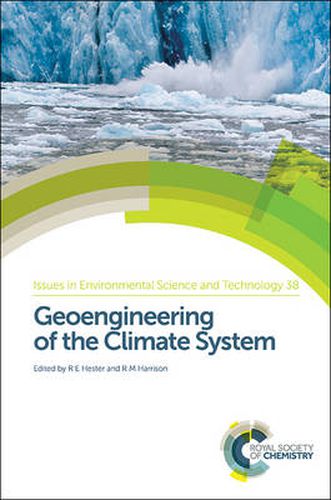Readings Newsletter
Become a Readings Member to make your shopping experience even easier.
Sign in or sign up for free!
You’re not far away from qualifying for FREE standard shipping within Australia
You’ve qualified for FREE standard shipping within Australia
The cart is loading…






It is generally accepted within the scientific community that anthropogenic emissions of greenhouse gases are primarily responsible for a recent warming in global climate and that current trajectories of emissions may lead to potentially catastrophic changes in climate. While reduction in emissions of greenhouse gases, and particularly carbon dioxide, could lead to a stabilisation of global temperatures, this requires international agreements which have yet to be achieved. A possible alternative, which has been widely mooted is to use methods known as geoengineering as an alternative way of limiting increases in global temperature. Geoengineering techniques fall into two main categories of carbon dioxide removal and solar radiation management; within each of these there are a number of options.
Following on from Carbon Capture (volume 29 in this series), Geoengineering of the Climate System presents an overview of the technologies currently being considered as large scale solutions to climate change, and considers some of the possible benefits and disadvantages of each. Invited contributions have been received by many of the leading experts on these technologies, and the volume provides a comprehensive overview of both carbon dioxide reduction and solar radiation management methods. These give rise to important ethical and governance issues which are also explored.
Written with active researchers, postgraduate students and policy-makers in mind, the latest addition to the Issues in Environmental Science & Technology series presents a balanced and informed view of this important field of research and is an essential addition to any environmental science library.
$9.00 standard shipping within Australia
FREE standard shipping within Australia for orders over $100.00
Express & International shipping calculated at checkout
It is generally accepted within the scientific community that anthropogenic emissions of greenhouse gases are primarily responsible for a recent warming in global climate and that current trajectories of emissions may lead to potentially catastrophic changes in climate. While reduction in emissions of greenhouse gases, and particularly carbon dioxide, could lead to a stabilisation of global temperatures, this requires international agreements which have yet to be achieved. A possible alternative, which has been widely mooted is to use methods known as geoengineering as an alternative way of limiting increases in global temperature. Geoengineering techniques fall into two main categories of carbon dioxide removal and solar radiation management; within each of these there are a number of options.
Following on from Carbon Capture (volume 29 in this series), Geoengineering of the Climate System presents an overview of the technologies currently being considered as large scale solutions to climate change, and considers some of the possible benefits and disadvantages of each. Invited contributions have been received by many of the leading experts on these technologies, and the volume provides a comprehensive overview of both carbon dioxide reduction and solar radiation management methods. These give rise to important ethical and governance issues which are also explored.
Written with active researchers, postgraduate students and policy-makers in mind, the latest addition to the Issues in Environmental Science & Technology series presents a balanced and informed view of this important field of research and is an essential addition to any environmental science library.